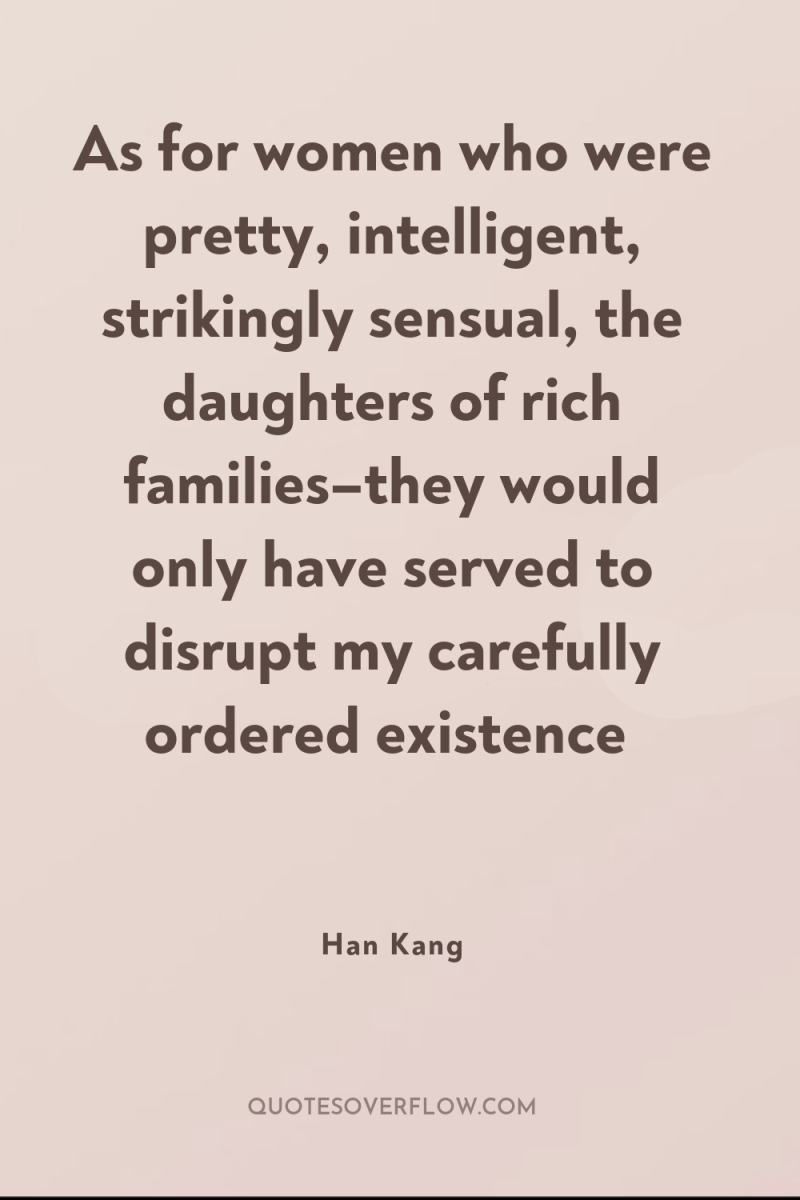1
Some memories never heal. Rather than fading with the passage of time, those memories become the only things that are left behind when all else is abraded. The world darkens, like electric bulbs going out one by one. I am aware that I am not a safe person.Han Kang

2
As for women who were pretty, intelligent, strikingly sensual, the daughters of rich families–they would only have served to disrupt my carefully ordered existenceHan Kang
3
I still remember the moment when my gaze fell upon the mutilated face of a young woman, her features slashed through with a bayonet. Soundlessly, and without fuss, some tender thing deep inside me broke. Something that, until then, I hadn't realised was there.Han Kang
4
I never let myself forget that every single person I meet is a member of this human race. And that includes you, professor, listening to this testimony. As it includes myself.Han Kang
5
For the first time, she became vividly aware of how much of her life she had spent with her husband. It had been a period of time utterly devoid of happiness and spontaneity. A time that she'd so far managed to get through only by using up every last reserve of perseverance and consideration. All of it self-inflicted.Han Kang
6
Even as a child, In-hye had possessed the innate strength of a character necessary to make one's own way in life. As a daughter, as an older sister, as a wife and as a mother, as the owner of a shop, even as an underground passenger on the briefest of journeys, she had always done her best. Through the sheer inertia pf a life lived in this way, she would have been able to conquer everything, even time. If only Yeong-hye hadn't suddenly disappeared last March. If only she hadn't been discovered in the forest that rainy night. If only all of her symptoms hadn't suddenly got worse.Han Kang
7
The saying goes that for a wound caused by dog bite to heal you have to eat that same dog, and I did scoop up a mouthful for myselfHan Kang
8
The feeling that she had never really lived in this world caught her by surprise. It was a fact. She had never lived. Even as a child, as far back as she could remember, she had never done nothing but endure. She had believed in her own inherent goodness, her humanity, and lived accordingly, never causing anyone harm.Han Kang
9
Or perhaps it was simply that things were happening inside her, terrible things, which no one else could even guess at, and thus it was impossible for her to engage with everyday life at the same time. If so, she would naturally have no energy left, not just for curiosity or interest but indeed for any meaningful response to all the humdrum minutiae that went on on the surface.Han Kang
10
Life is such a strange thing, she thinks, once she has stopped laughing. Even after certain things have happened to them, no matter how awful the experience, people still go on eating and drinking, going to the toilet and washing themselves - living, in other words. And sometimes they even laugh out loud. And they probably have these same thoughts, too, and when they do it must make them cheerlessly recall all the sadness they'd briefly managed to forget. .Han Kang
11
(Blurb) Throughout Human Acts the ghost memory of the boy Dong-Ho wanders, refusing to disappear, and so in turn other characters refuse to stop asking 'Why?' Why does power exert itself with brutality? Why does the state silence the enquiries of the bereaved? Why does remembrance pose such a threat to the powerful?Han Kang
12
The kind of woman whose goodness is oppressiveHan Kang
13
The feeling that she had never really lived in this world caught her by surprise. It was a fact. She had never lived. Even as a child, as far back as she could remember, she had done nothing but endure. She had believed in her own inherent goodness, her humanity, and lived accordingly, never causing anyone harm. Her devotion to doing things the right way had been unflagging, all her successes had depended on it, and she would have gone on like that indefinitely. She didn't understand why, but faced with those decaying buildings and straggling grasses, she was nothing but a child who had never lived. .Han Kang
14
Only Yeong-hye, docile and naive, had been unable to deflect their father's temper or put up any form of resistance. Instead, she had merely absorbed all her suffering inside her, deep into the marrow of her bones. Now, with the benefit of hindsight, In-hye could see that the role that she had adopted back then of the hard-working, self-sacrificing eldest daughter had been a sign not of maturity but of cowardice. It had been a survival tactic. .Han Kang
15
The more she laughs, the more he ups the ante with his clowning. By the time he finishes he will have run through all the secret mysteries of laughter that human beings have ever understood, mobilizing everything at his disposal. There is no way for him to know how guilty it makes his mother feel, seeing such a young child go to such lengths just to wring a bit of apparent happiness from her, or that her laughter will all eventually run out.Han Kang
16
Why is such a bad thing to die?Han Kang
17
She's a good woman, he thought. The kind of woman whose goodness is oppressive.Han Kang
18
I'm fighting alone, every day. I fight with the hell that I survived. I fight with the fact of my own humanity. I fight with the idea that death is the only way of escaping this fact.Han Kang